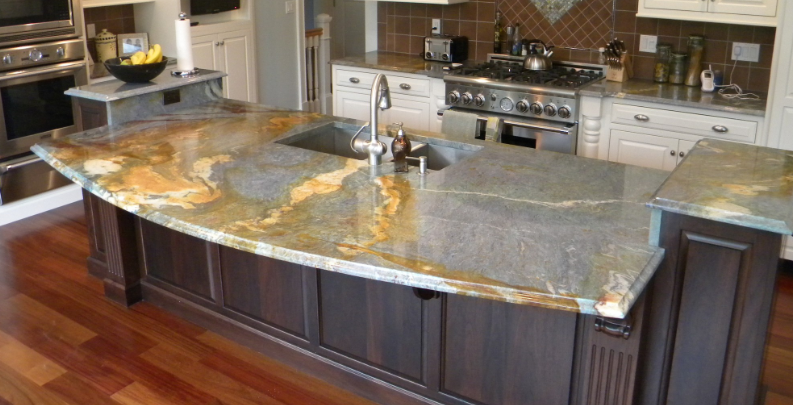Key Takeaways
- Durability: Granite is much more durable than marble. It’s better at resisting scratches, heat, and stains, making it ideal for busy kitchens.
- Appearance: Marble offers elegant veining and a classic look, while granite provides bold patterns and more color variety.
- Maintenance: Granite requires yearly sealing and simple cleaning. Marble needs more frequent sealing and immediate attention to spills.
- Cost: Marble generally costs more upfront and over time due to higher material prices and maintenance requirements.
- Best Use: Granite is better for family kitchens with heavy use. Marble shines in luxury settings that focus on aesthetics over practicality.
Are you comparing granite vs marble as the better choice for your kitchen countertops? This comprehensive guide breaks down their pros and cons, so you can make the best decision for your home, lifestyle, and budget.
What’s the Difference Between Granite and Marble Countertops?
Granite and marble have many differences in their composition, durability, and aesthetic qualities. Is granite better than marble for kitchen countertops? That depends on your specific needs and preferences.
Granite is an igneous rock formed by volcanic activity. It’s harder, more resistant to heat and scratching, and has a speckled appearance with rich color variations. Marble is a metamorphic rock made from limestone, known for its smooth veining and soft, luxurious feel—but it’s also more delicate.
Visually, granite offers a bold, natural pattern with earthy tones and crystalline textures. Marble exudes elegance with its flowing veins and lighter color palette, usually in white, gray, or cream.
Core Differences Between Granite and Marble:
- Formation: Granite is igneous; marble is metamorphic
- Durability: Granite resists heat and scratches; marble is softer and more porous
- Appearance: Granite has granular patterns; marble features refined veining
- Feel: Granite is rugged; marble is smooth and classic
- Upkeep: Granite needs less maintenance than marble
If you want bold texture and practical durability, choose granite. If visual elegance is your priority and you don’t mind extra care, marble may be the better fit.
Which Material Lasts Longer in a Kitchen Countertop?
When comparing longevity between granite and marble, granite has the edge over marble in long-term durability, especially in busy kitchens. It handles wear and tear, resists heat damage, and stands up to spills far better than marble. Marble, while durable in the right setting, is more prone to staining, etching, and scratching—particularly when exposed to acidic foods.
Why Granite Countertops Last Longer:
- Harder surface: Better at resisting chips and scratches
- Heat resistance: Tolerates hot pans and appliances
- Low porosity: Less vulnerable to moisture damage
- Minimal upkeep: Needs sealing, but not frequent attention
If you’re cooking daily or have a household with kids or guests, granite is the more durable, longer-lasting choice for your kitchen countertops.
How Do Granite and Marble Compare in Countertop Maintenance?
Is marble too high-maintenance for kitchen countertops? Many homeowners ask this question when deciding between these two materials. Granite requires less day-to-day attention than marble. It needs sealing about once a year and basic cleaning with gentle soap. Its natural density makes it more stain-resistant. Marble, by contrast, is high-maintenance. It needs more frequent sealing, and it reacts poorly to common acidic substances like lemon juice, wine, or tomato sauce.
Maintenance Requirements Comparison:
- Granite Maintenance:
- Seal once a year
- Wipe with pH-neutral cleaner
- Tolerates most spills if cleaned promptly
- Marble Maintenance:
- Seal twice a year
- Avoid acidic foods and harsh cleaners
- Blot spills immediately to prevent staining or etching
Granite is ideal for homeowners who want a beautiful countertop without needing to babysit the surface. Marble demands more effort but, that effort is rewarded with beauty and elegance.
Which Is More Expensive: Granite or Marble Countertops?
When comparing costs, marble generally costs more than granite—both upfront and over time. Marble slabs are often imported, cut more carefully, and need more maintenance. All these things drive up the price. Granite still offers high-end appeal but comes in a wider price range. This makes it more flexible for different budgets.
Cost Considerations for Natural Stone Countertops:
- Material Cost: Marble tends to start at a higher price point
- Installation: Marble is more delicate, which can increase labor costs
- Upkeep: Marble may need more frequent resealing and care products
- Variety: Granite offers more affordable options without sacrificing quality
Granite is the more cost-efficient option if budget is a concern. Marble is better suited for luxury remodels that focus on looks over costs.
What Are the Pros and Cons of Granite vs Marble Kitchen Countertops?
Both surfaces offer beauty and performance—but with different strengths. Granite boasts more resilience and variety. People love marble for its timeless elegance and a cooler touch that’s great for baking. But, you need to know their potential downsides before making a decision.
Pros and Cons Comparison:
Granite Pros and Cons:
- Durable and scratch-resistant
- Heat-safe and stain-resistant
- Available in bold colors and textures
- May show seams in large areas
- A slightly more rugged, less refined aesthetic
Marble Pros and Cons:
- Smooth, elegant veining
- Ideal surface for pastry or dough
- Elevates visual appeal in high-end kitchens
- Susceptible to etching, scratching, and staining
- Requires careful maintenance and sealing
Choose granite for strength, function, and visual versatility. Choose marble if you’re committed to its look and don’t mind handling it with care.
Which Countertop Material Is Better for Home Resale Value?
Which stone countertop adds more value to your home? Granite tends to offer better resale value for the average buyer, while marble adds to the appeal of upscale, luxury homes. Granite is a durable, stylish, and low-maintenance choice that real estate agents highlight in listings. Marble’s elegance can be a selling point in luxury homes—but many buyers don’t understand its upkeep requirements.
Resale Value Factors:
- Granite’s wide appeal makes it a safe investment for any remodel
- Marble stands out in design-conscious markets or luxury renovations
- Homebuyers with kids or busy lifestyles may prefer granite
- A clean, well-maintained surface—regardless of material—adds value
Granite appeals to more buyers and can boost listing interest. Marble may command more attention in high-end listings but isn’t always practical.
Is Granite or Marble Better for a Busy Family Kitchen?
Granite is hands-down the better choice for active homes and kitchens. It handles hot pots, sharp knives, and messy spills with minimal wear. Marble is beautiful, but its porous. That makes it more vulnerable to everyday kitchen hazards—especially in homes with kids or lots of cooking.
Why Granite Suits Family Kitchens:
- Resistant to staining from juice, sauces, or oils
- Tough enough to handle dropped utensils and accidental bangs
- Easier to clean up during hectic meal prep or after-school chaos
- Doesn’t need constant monitoring like marble
For families, granite wins on every front—durability, ease of care, and long-term functionality.
Granite vs Marble for Kitchen Countertops FAQs
Is granite or marble more scratch-resistant?
Granite is more scratch-resistant because it’s a harder, denser material. It stands up well to knives, pots, and pans, making it ideal for high-use kitchens. Marble is softer and more likely to scratch from utensils or dropped items.
Can marble be used in kitchens with kids?
Marble can be used in family kitchens, but that requires extra care and attention. It’s more vulnerable to stains, scratches, and etching from spills like juice or tomato sauce. If you have young children, granite may be a better fit for long-term durability.
Does granite need to be sealed?
Yes, granite should be sealed, but it doesn’t need much upkeep. Most types of granite only need sealing once a year to protect against moisture and stains. The process is quick and helps the stone maintain its appearance over time.
What colors are available in granite and marble?
Granite comes in a wide variety of colors, including black, gray, white, green, blue, and even red tones, often with speckled or mottled patterns. Marble usually has lighter shades like white, cream, and gray, with veining that gives it a refined, classic appearance. Both have many options that can match different kitchen styles.
Can I install granite or marble countertops myself?
DIY installation is not recommended for either granite or marble. These materials are heavy, need precision cutting, and can crack or chip if mishandled. Professional installation ensures a proper fit and prevents costly damage during the process.
Granite vs Marble at a Glance
Choose Granite Countertops If:
- You cook often or have kids and pets
- You want something durable and low-maintenance
- You’re working with a flexible or limited budget
Choose Marble Countertops If:
- You want a luxurious, high-end look
- You don’t mind regular sealing and upkeep
- You’re designing a space focused more on beauty than function
Should You Choose Granite or Marble for Your Kitchen Countertops?
Choosing between granite and marble depends on your lifestyle, priorities, and kitchen use. Granite delivers long-term durability, lower maintenance, and broader design versatility—making it ideal for busy homes or those looking for a mix of style and performance. Marble, with its soft veining and refined elegance, suits homeowners who focus on luxury aesthetics and can handle the upkeep.
At the end of the day, both materials have a huge impact on your kitchen. The best countertop is the one that fits how you live, cook, and entertain—while giving you home the look you want. Whether you lean toward granite’s resilience or marble’s charm, each has value when you put thought into the decision.
For most homeowners, granite provides the best balance of beauty, durability, and value. But, if you’re passionate about marble’s unique aesthetic and willing to commit to its care requirements, it can be an excellent choice.





